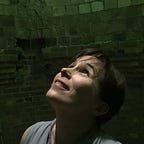On Seeing the World From a Different Point of View
(Originally Published at Unbound Worlds, September 28, 2016)
When I was a kid, I thought the world of Alec Bings.
If you don’t remember him, Alec is the character in The Phantom Tollbooth who Milo and Tock encounter near Point of View, just after leaving Dictionopolis.
“Stretching below, to the left, the right, and straight ahead, as far as anyone could see, lay the rich green landscape through which they had been traveling.
‘Remarkable view,’ announced the Humbug, bouncing from the car as if he were responsible for the whole thing.
‘Isn’t it beautiful?’ gasped Milo.
‘Oh, I don’t know,’ answered a strange voice. ‘It’s all in the way you look at things.’”
— from The Phantom Tollbooth by Norton Juster
Right at that point where I met Alec Bings (I was nine, maybe ten), I became fascinated with point of view. Mostly I think that’s because the way I saw things at the time was a bit different than other people my age, being pretty small (so Alec’s ability to grow down rather than up might have caught my attention), but also I’d realized early that not everyone saw the same facts in the same way.
When I began to think about the world of Updraft and its companion, Cloudbound, I knew very early that I could tell its story from one of several perspectives — including Kirit’s, who is the narrative voice of Updraft, and Nat’s, her best friend. And as I wrote Updraft, I realized that Nat’s voice was going to be important for Cloudbound. It would allow exploration of different parts of the Bone Universe — particularly the politics and people networks of the city — in a way that Kirit probably wouldn’t.
Especially with first person point of view, readers become very familiar with a certain voice and a certain worldview early. The literary device of the “I” as narrator becomes a mask that we can look through, and adventure in, using the persona of that character.Different perspectives unearth different layers and different ways of seeing the world.
Shifting narrators between books means taking a risk — jarring a reader’s assumptions about the world, the story, and the characters themselves.
In the case of Cloudbound, that was a really important thing to do, and worth the risk. Cloudbound is a story about leadership, and Nat is a very different character from Kirit. He’s more investigative, more determined to play by the rules — even when he doesn’t know the rules — and he’s had a very different life experience from Kirit’s. (Kirit, if you’re wondering, is quite happy to run through walls in order to achieve an objective.)
Allowing Nat to explore the city of living bone in his own way, and to see Kirit as she’d once seen him, also gave me the opportunity to reveal parts of the world and the story that Kirit might not have seen herself.
Another aspect of first person point of view: it’s highly connected to what that character knows and sees. So allowing for different points of view opens up that world tremendously, and reveals new insights, because the character who’s driving the story now has different goals and interests.
Authors can play with point-of-view between books to excellent effect. N.K. Jemisin’s Inheritance Trilogy tells the story of her world through three first-person points of view — Yeine, Oree, and Shahar. Phillip Pullman’s His Dark Materials allows Lyra and Will to tell their story.
Other books, like Jeff Vandermeer’s Southern Reach Trilogy, use a close third person point of view that feels very close at times. Ursula Le Guin’s Earthsea Trilogy, also in third person, lets us see the archipelago from Ged’s story as well as Tenar’s.
In each of these cases, the point of view changes from book to book allow deeper exploration of a complex world, as well as different ways into the world for different readers. It gives readers a chance to experience empathy for multiple characters as well, which can be a very good thing.
In fiction, as in the real world, exploring different points of view and understanding that there are many ways to tell a story deepens experience. Different perspectives unearth different layers and different ways of seeing the world. I think that’s really important.
Back to Alec Bings for a minute… I admit that Alec being a full body height higher than Milo probably initially attracted my attention, but I’m pretty sure it was Alec’s mention of others near him, who occasionally grew upside down, feet skyward, that cemented my interest in different points of view.
“Oddly enough, they often grow ten times the size of everyone else,” said Alec thoughtfully, “and I’ve heard that they walk among the stars.”
